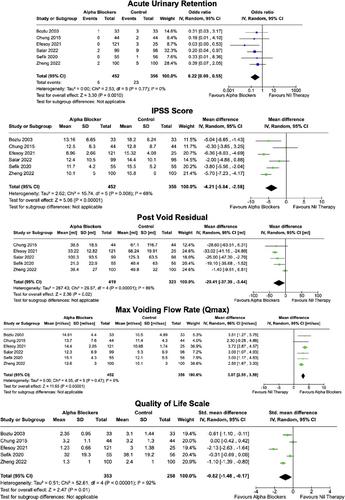Perioperative alpha blockers in voiding dysfunction secondary to prostate biopsy: A meta-analysis
Abstract
Introduction and Objectives
Voiding dysfunction remains a common side effect postprostate biopsy leading to significant morbidity. Alpha blockers have emerged as a potential therapeutic option to mitigate this risk, with various centres already incorporating its use in practice. Despite this, the literature regarding its efficacy remains inconclusive. Hence, a systematic review was performed to quantify the effect of perioperative alpha blockers on prostate biopsy-related voiding function.
Methods
A systematic search in MEDLINE, Embase and PubMed between January 1989 and July 2023 was performed to identify relevant articles. Two independent reviewers independently screened abstracts, full texts and performed data extraction. Data including International Prostate Symptom Scores (IPSS), voiding flow rates (Qmax), postvoid residuals (PVR), rates of acute urinary retention (AUR) and quality of life (QoL) scores were extracted. Results were combined in an inverse variance random effects meta-analysis.
Results
A total 808 patients from six randomised controlled trials (RCTs) comparing alpha blockers to controls were included. All articles excluded patients with pre-existing voiding dysfunction. Pooled outcomes demonstrated statistically significant differences favouring alpha blocker usage in all objective and subjective measures including IPSS (mean difference 4.21, 95% confidence interval [CI] 2.58–5.84, p < 0.00001), PVR (mean difference 20.41 mL, 95% CI 3.44–37.39, p = 0.02), Qmax (mean difference 3.07 mL/s, 95% CI 2.55–3.59, p < 0.00001), QoL (weighted-mean difference 0.82, CI 0.17–1.48, p = 0.01) as well as overall risk of AUR (odds ratio 0.22, CI 0.09–0.55, p = 0.001). There was variable heterogeneity (I2 = 0–86%) between outcomes.
Conclusions
This review highlights the potential role of alpha blockers in improving urinary function and reducing adverse voiding outcomes postprostate biopsy. The standard practice of incorporating the usage of perioperative alpha blockers may be considered to reduce the morbidity of voiding complications secondary to prostate biopsy.


 求助内容:
求助内容: 应助结果提醒方式:
应助结果提醒方式:


